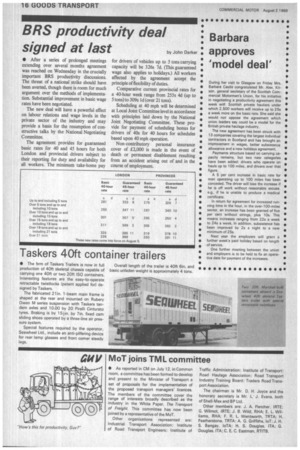BRS productivity deal signed at last
Page 18

If you've noticed an error in this article please click here to report it so we can fix it.
by John Darker • After a series of prolonged meetings extending over several months agreement was reached on Wednesday in the crucially important BRS productivity discussions. The threat of a national strike should have been averted, though there is room for much argument over the methods of implementa tion. Substantial improvement in basic wage rates have been negotiated.
The new deal will have a powerful effect on labour relations and wage levels in the private sector of the industry and may provide a basis for the resumption of constructive talks by the National Negotiating Committee.
The agreement provides for guaranteed basic rates for 40 and 45 hours for both London and provincial drivers subject to their reporting for duty and availability for all workers. The minimum take-home pay for drivers of vehicles up to 5 tons carrying capacity will be 326s 7d. (This guaranteed wage also applies to holidays.) All workers affected by the agreement accept the principle of flexibility of duties.
Comparative current provincial rates for a 40-hour week range from 255s 4d (up to 5 tons) to 309s Id (over 21 tons).
Scheduling at 40 mph will be determined at Local Joint Committee level in accordance with principles laid down by the National Joint Negotiating Committee. These provide for payment of scheduling bonus for drivers of 40s for 40 hours for schedules based upon 40 mph operation.
Non-contributory personal insurance cover of £2,000 is made in the event of death or permanent disablement resulting from an accident arising out of and in the course of employment.




































































































